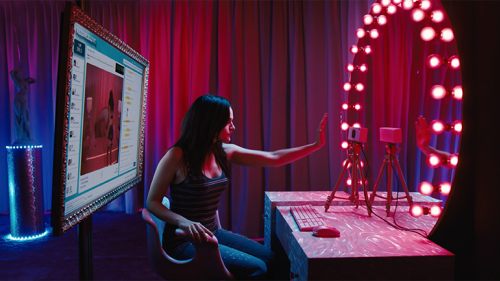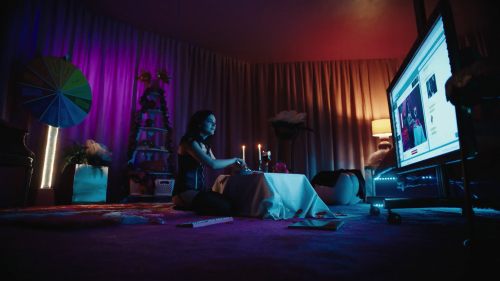The Internet As A Demon In CAM And PERFECT BLUE
We’re still figuring out how to live with ourselves on the internet. After more than a decade of living with social media, being online is still hard, and not just because the early promise of a utopian, unfiltered and unrestrained network of information and communication has continually come back round to bite us in the ass. Further still, it can become dissociative and depressing - constantly seeing the best of everyone, and struggling to meet that expectation can be exhausting. What you present of yourself online may not be all of you, for fear of appearing lesser than anyone else. CAM and Perfect Blue both tackle the horror of letting that online image take over, of letting it slip out of your grasp. Both thrillers centre around a fake, manufactured mirror of the main character created through the internet, that then begin to ruin their livelihood, as their presentation of themselves slips out of their control.
Made in the mid '90s, during the internet’s first steps, Perfect Blue almost presents the inception of the ideas that plague CAM. In the former, Mima, an ex-pop star hoping to make her name as an actress, has to be introduced to the internet by her manager Rumi. The total ignorance of something so integral to how we live now is funny (“what’s a website?”), but what follows leads to the consideration that perhaps being without it isn’t so bad. Soon after logging on, Mima is disturbed by a forum named ‘Mima’s Room’, a seemingly innocuous fan site that is revealed to be the diary of a stalker, detailing her days down to the most irrelevant minutia.
Paranoia soon takes ahold of Mima, as the unknown host of the site leverages her obsessive fanbase and intimate knowledge of her life to take ownership of it. Each new entry on the site attempts to dictate how she feels about her move into acting, and the similarities between what the site presents and Mima’s uncertainties about her new profession leads her to begin questioning her own actions as well as what is real. As Mima moves further away from her sugary, bubblegum pop star personality, she has nightmares about being stalked by an image of her previous personality - who then seemingly takes bloody vengeance on those who have led Mima astray.
The horror of Perfect Blue tends more towards the psychological, as Kon employs a big bag of tricks to make Mima’s identity crisis feel as visceral and disturbing as possible. Clever, forceful editing makes the line between how she feels, what she imagines and what she does feel indistinct, until everything blends together in an intense, surreal 3rd act. Her inner turmoil becomes just as real to us as the actual threat to her life.
Mima’s uncertainty and loss of control only becomes worse when the bodies begin to stack up around her. If Satoshi Kon’s final work Paprika draws a connection between the internet and dreams as a therapeutic outlet for the subconscious mind, then Perfect Blue is the internet as a nightmare; Mima’s most discomforting thoughts and fears uncannily reflected back at her.
The main threat of CAM is similar, though somewhat more direct, as the protagonist, Alice (who, online, goes by Lola), comes under threat by her camming profile, now acting independently, and with her face. Her work as a camgirl isn’t presented as some dark secret - with the exception of her mother, she’s got a large network of support around her, including her younger brother. Isa Mazzei’s sharp, refreshing and sex-work positive script never patronises or moralises about Alice’s work. The film opens with the mundane housekeeping and management that Alice’s job requires, and continue throughout to treat it as just that: a job (Mima’s work in television appears infinitely more exploitative by comparison). The film opens on Alice/Lola hosting a cam session that’s fairly tame until a new user joins and makes some dark requests, which Lola then obliges. But, it’s revealed that she is spinning a fiction, gaming her audience in a stunt to gain more online popularity.
Once Alice becomes locked out of her account and ‘Lola’ takes over however, the webcam demon immediately begins doing things that Alice (who is shown to be pretty game to stage a grim con) wouldn’t. You can see the same tension between one’s inner and outer life as presented in Perfect Blue. It’s not too dissimilar to the divide between Mima we see acting, and the one we see in ‘Mima’s Room’. Mima ends up being strung along by an agent who is too willing to overlook how she actually wants to break into the industry - enthusiastically signing her up for rape scenes in her first TV role on the True Detective prototype ‘Double Bind’, as well as nude photoshoots. Mima doesn’t really protest at first, distracted by that ghostly apparition of her former self, but later reveals in an outburst that she hates it.
In both cases, the film’s horror comes from this sort of dissociative state, and how people might take advantage of it. Perfect Blue combines this separation with uncertainty of what is real and what isn’t. Despite being pretty surreal in its own right, CAM takes a more straightforward approach in that respect, making this separate persona a malevolent entity that stands alone, rather than a symptom of another person’s obsession. The nightmare that CAM presents is more about the act of being online - cautious and wary about how people wield the anonymity and ability to sculpt your image that the internet affords.
It’s a very specific kind of horror that these films deal with, looking at how we make ourselves appear better and more desirable through the filter of social media, and what happens when that image begins to deviate from the person that you are every day, highlighting the stress of keeping the perception your have of yourself, and the perception others hold of you, one and the same. Via taut, spooky thrillers, Kon, Mazzei and Goldhaber explore how easy it can be to lose yourself in the internet, and how it presented a new avenue of threat for women, as possessiveness over their bodies migrated online along with everyone else.



